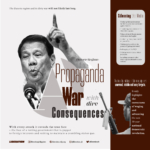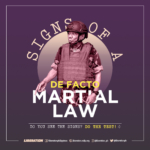Have we got the government we deserved?
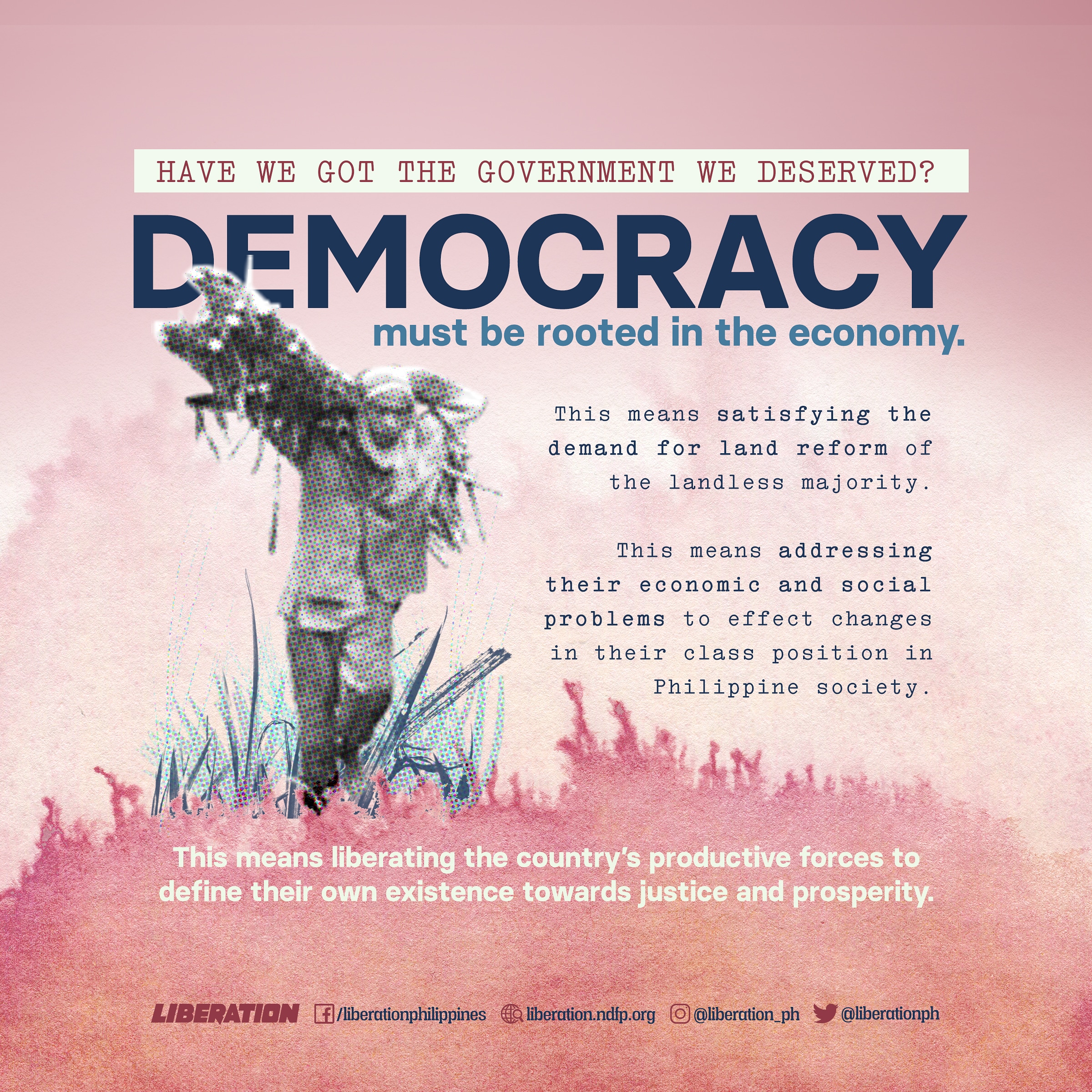
The midterm elections of 2019 have come and passed, as in previous ones, tainted with doubts over the results and assumptions of machinations by those in power.
As cynically expected, the Duterte regime emerged “victorious”. Almost all of its candidates were declared winners, with its most loyal vassals – the omnipresent presidential assistant Bong Go and the comedian former Philipppine National Police (PNP) Director Ronald ‘Bato’ de la Rosa – making it to the top-6 circle in the senatorial race.
Now the President has got the supermajority in the Senate, aided by the comebacking election of scions of political dynasties, the daughter of a deposed dictator, a known plunderer, and a celebrity wannabe.
The opposition Liberal Party has been crippled, as the Otso Diretso senatorial slate did not win a single seat. And progressive candidate Neri Colmenares – who notably consistently engaged the administration on timely and popularly-supported issues throughout the campaign period – saw his votes in the 2016 elections shaved by 1.7 million votes. “Duterte magic?” asked a skeptical election analyst.
Having retained a clear majority in the House of Representatives, Duterte has openly dictated a term-sharing scheme for the Speakership in the 17th Congress: the first 15 months on the rostrum for Representative Alan Peter Cayetano of Taguig, and the remaining 21 months for Representative Lord Velasco of Marinduque. Before this arrangement, Duterte’s son Paulo (elected Davao City congressman) and daughter Sara (reelected Davao City mayor) unabashedly displayed their own power-tripping by forming a “Duterte Coalition” in the House to back up comebacking Davao City Representative Isidro Ungab for Speaker.
The sole positive aspect of this election was the tenacity and resiliency with which the progressive partylists belonging to the Makabayan Coalition defiantly withstood and prevailed against the sustained, vicious, nationwide attacks and deceptions used against them by the military-bureacratic machine of the Duterte regime.
To a considerable extent, the voters rejected the regime’s open campaign of “zero votes for the Makabayan partylists,” aimed at dislodging the progressives from their congressional seats held since 2001. Bayan Muna won the three maximum seats allowed by the law, while Gabriela Women’s Party, Act Teachers, and Kabataan Party won a seat each. Only Anakpawis fell short in attaining the number of votes for one seat. The Makabayan bloc, the real consistent opposition in the House, remains intact.
The state machinery was slyly at work before, during, and after the elections. Its most brutal attacks were aimed at progressive candidates and partylists – ranging from killings, arrests and trumped-up charges, harassments and threats, to interminable red-tagging. Brazenly disregarding the clear prohibition by the Constitution, the PNP and the Armed Forces of the Philippines openly engaged in electioneering, campaigning against the progressives even on election day. Vote buying was more massive and rampant than ever. And the much-assailed automated election system (AES), used for the fourth time, recorded the worst incidences of malfunctions that appeared to have been intentional, not accidental (as one IT expert remarked).
Nevertheless, the elections are over and as the winners claim, “The people have spoken.”
Really?
WHAT FALLACY
The elections are meant to be a democratic exercise. The exercise is said to be a great equalizer – rich or poor, everyone is entitled to only one vote. But that is the fallacy of the ballot-box equality. In a class society like the Philippines, the machinery of the state is lodged in the hands of a few, of the rich and the powerful. The great majority is, in reality, represented only in name in these processes and has no real say in the turnout of the elections.
In truth, elections only make it possible for the ruling class to use democratic institutions in furthering their own interests. They have the economic, political, and armed means to use power practically at their whim. This is no democracy at all.
The much-touted “free, fair and honest elections” aphorism is an illusion. Practically anyone who is of age and has the mental capacity can run for public office, but only the moneyed elite can successfully run a campaign, or simply resort to vote buying. The people can choose their representatives, but again only from among the moneyed and the elite. Even if asked to vote wisely, many people are bribed, fooled, hoodwinked, cheated, or forced to vote even for the most undesirable of their oppressors. People want a peaceful election, but threats, intimidation, and violence abound.
When Otso Diretso lost to Duterte, some sectors started calling the voters “bobotante”. The system, not the people, is the culprit. Elections in a semifeudal and semicolonial society are a hoax and fraud is a common occurrence.
Democratic laws and institutions are ample in this Republic claiming to be a democratic state – but only in form, not for real. Human rights are enshrined in the Constitution but state officials are the first to violate, dismiss or disregard the laws. Duterte is a prime example. There are three branches of government for check and balance. But the ruling regime regards all the key posts within the president’s appointing authority as juicy positions to reward its loyalists and supporters.
The minority rules and the majority suffer. That is the meaning of democracy in a semifeudal and semicolonial country.
Despite this rude reality, it is important for the people to participate in the elections as a way to experience and develop their consciousness about how rotten the system is, and what fundamental changes need to be done. The elections become a training ground for the development of revolutionary consciousness. It makes people realize that democracy is lip-service and that the voice of the people can be suppressed or manipulated at any time.
Even elected officials whom the people may initially have felt were true to their promises can turn out to be corrupt, or worse, to be tyrants as in the case of Duterte. The ancient Greeks invented the term tyrant to mean agents of the people who became dictators.
In some cases, progressives and reformers are able to gain power or concessions but only in a limited or temporary sense, and as generally defined, may be tolerated or allowed by the ruling system. Again, this is more an exception than the rule; and exceptions do not make the rule. Once the ruling regime unleashes its full terror, there is no more room for democratic pretensions and all arenas for open people’s participation are deemed closed.
PURSUING DEMOCRACY
Be that as it may, the National Democratic Front of the Philippines, under the leadership of the Communist Party of the Philippines (CPP), has even more reason to pursue democracy not just in form but in substance. Its significance – the rule of the majority – is aimed not just in politics but more so in the economic sphere.
In the Philippine context, this means liberating the most numerous, yet also the most oppressed, class – specifically the farmers and agricultural workers who comprise 70% of the population – from oppression and exploitation by a privileged minority.
Hence to stand its ground democracy must be rooted in the economy, which means satisfying the demand for land reform of the landless majority. This means addressing their economic and social problems to effect changes in their class position in Philippine society. This means liberating the country’s productive forces to define their own existence towards justice and prosperity. For too long, widespread landlessness has engendered gross poverty and inequality not just for the peasantry but also for other oppressed classes.
Hence in waging the people’s democratic revolution, the struggle for land takes precedence over all other demands of the people. This is basically an agrarian war. The peasants, in alliance with the working class, have to wrest control of the land from the ruling elite as a means to end poverty and inequality. This is a struggle that may be bloody, because the most reactionary class, the landlords, will not take this sitting down when their land monopoly is challenged, or private property is subdivided and distributed among the tillers of the land.
In due time, as the revolution advances the will of the majority shall find expression not just in the economy but in politics as well. One who holds economic power wields political power. Hence the dominant position of the great majority must be secured for the flowering of true democracy.
Revolutionaries are aware that the quest for democracy does not stop with the victory of the bourgeois-democratic revolution but shall be carried on to the next stage, the socialist revolution. Ultimately the working class becomes the majority of the population, and the dominant class as well. The leadership of this class will find expression in a proletarian state until such time that the people can govern their own lives with no more need for classes or states.
As Lenin put it, it is not the bourgeoisie but the proletariat who can make democracy happen.
True enough, in the Philippines and through the leadership of the proletarian party, the CPP, changes are becoming more visible in many guerrilla fronts in the country.
Emboldened by the revolution, the peasants in the countryside are not just taking up arms to fight for their rights; they are building their own organizations and setting up organs of political power. Elections are called in a truly free, fair and honest manner; the ballot is treated as sacred; representatives are selected from their own ranks and are subject to recall when they err.
Group meetings, mass assemblies, education sessions, deliberations, consultations have become as common as farming. The people are involved in governance as well as in policy-making. Even matters related to production is no longer just an individual or family decision but is addressed by the entire community.
Once the majority of the people gains the power over their own lives – that will be democracy. And that is what the ruling class fears most: an awakened citizenry schooled in the ways of democracy.#
—–
VISIT and FOLLOW
Website: https://liberation.ndfp.info
Facebook: https://fb.com/liberationphilippines
Twitter: https://twitter.com/liberationph
Instagram: https://instagram.com/liberation_ph

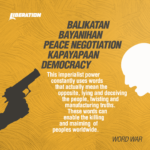
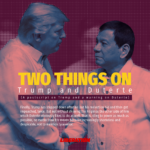
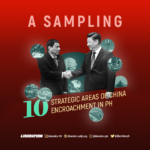

 Difficult times
Difficult times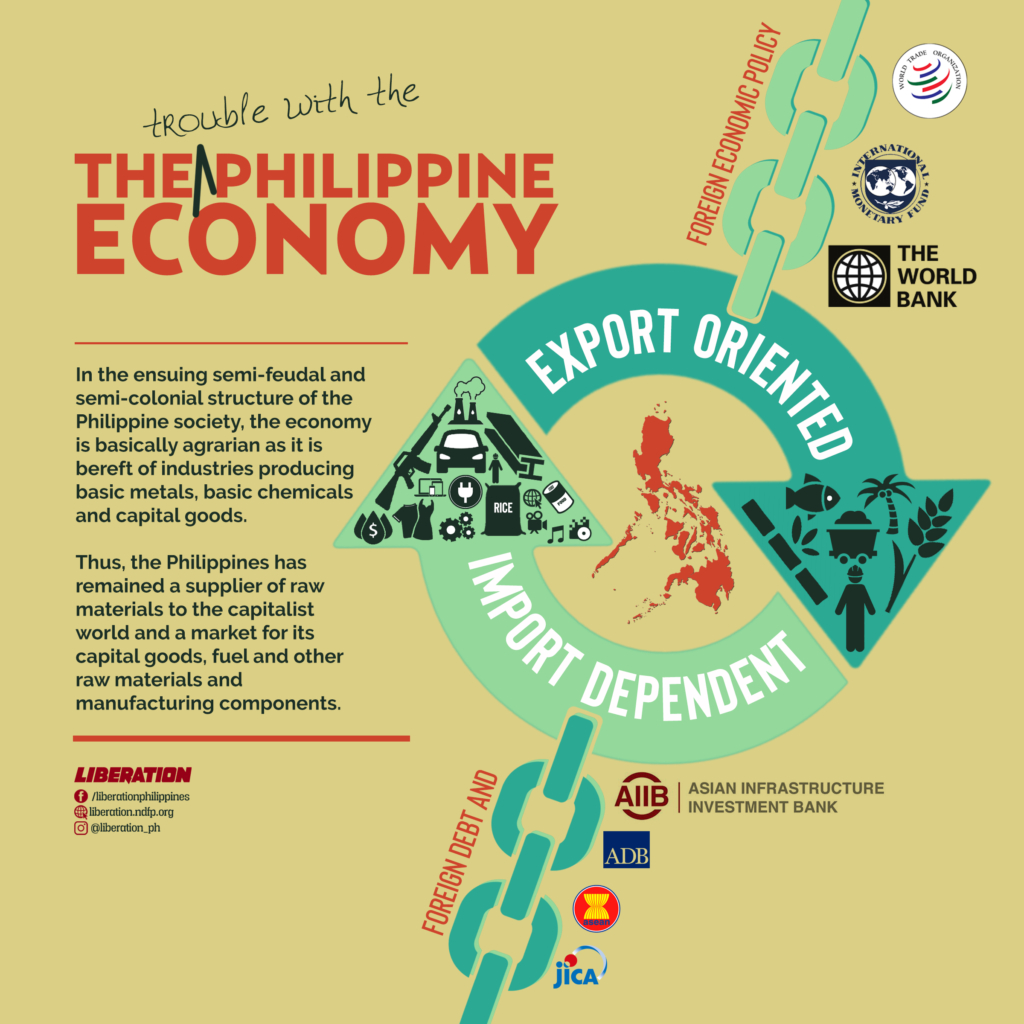 Nature of economy
Nature of economy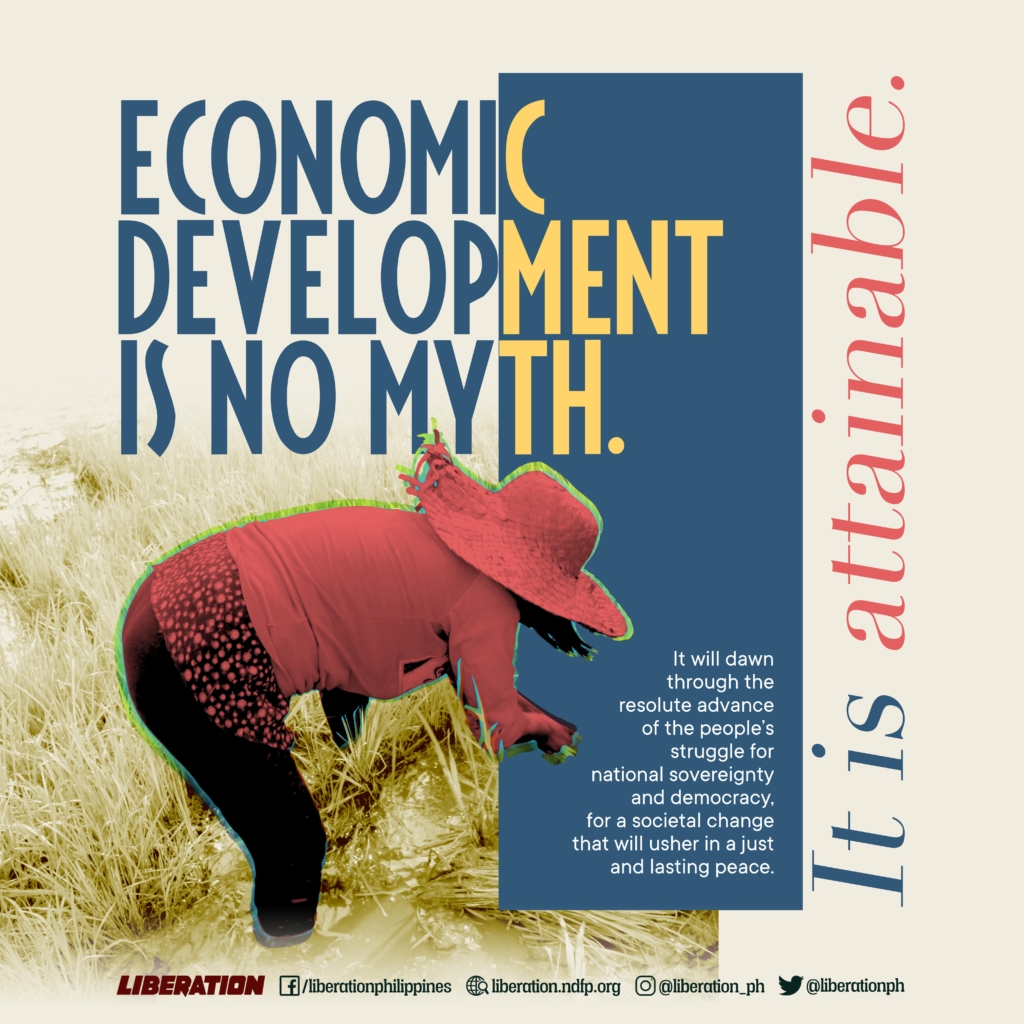 Key to development
Key to development